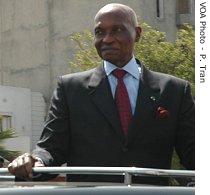2007年VOA标准英语-Senegal's Presidential Coalition Wins Boycotted(在线收听)
Dakar
07 June 2007
Senegal's electoral commission confirmed the presidential coalition's apparently easy victory in last Sunday's legislative election, which was boycotted by major opposition parties. The coalition dominates the legislature with 131 out of 150 seats. Phuong Tran reports for VOA from Dakar that analysts say the lack of any real legislative opposition will hurt Senegalese democracy.
According to the ministry of interior, 35 percent of eligible voters cast ballots, compared to 67 percent in the previous legislative election.
A leader of the opposition coalition that called the boycott, Moustapha Fall, says President Abdoulaye Wade can no longer ignore the opposition.

Abdoulaye Wade (file photo)
About a dozen of the biggest opposition parties called the boycott to protest President Wade's victory earlier this year. Fall and other members of the opposition claimed Mr. Wade won through widespread fraud, even though international and national observers said his election was largely free and fair.
Fall says the low turnout shows President Wade is politically weak, and that the president will be forced to meet with the opposition. A group of civil society associations that attempted, unsuccessfully, to bring the president and opposition parties together to prevent the boycott said the new legislators lack legitimacy.
Apparent election winner and member of the presidential ruling coalition, Abdou Fall, says previous legislative elections also had low turnouts, even without a boycott.
The ministry of interior reports less than 40 percent voting in both the 1993 and 1998 legislative elections.
But Senegalese political analyst Yoro Dia attributes past voter apathy people's belief that the elections were unfair. Once President Wade was elected in 2000, the analyst says things changed for a while because Senegalese felt they finally had a political voice. But Dia says the opposition's decline is a setback for Senegal.
"In the parliament, meaning the heart of debate in democracy, you will not have the opposition," said Dia. "And no one can rule a country ignoring the opposition that represents 45 percent of the population."
Before this legislative election, the ruling coalition controlled three-quarters of the legislature.
Once the judicial system confirms the commission's electoral results, Dia says the coalition will control the newly enlarged parliament, with less than 20 seats held by several small parties outside the ruling group.
Dia says with the opposition's role in parliament diminished it may take to the streets to be heard and that may cause problems.
"The opposition will show [it] does not agree with what [President] Wade is doing. The parliament was a good place to say it. If they do not say it in the parliament, they will say it in the streets," he said. "If they say it in the streets, it will mean riots and demonstrations."
Dia says during his time as opposition candidate, President Wade denounced what he saw as unfair elections, also taking his case to the street to lobby public support.